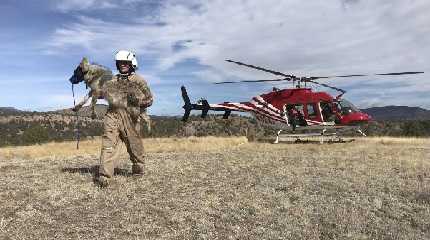
MONDULKIRI, Cambodia, Oct. 23 (Xinhua) -- Officials and conservationists in Cambodia on Saturday called for an end to wildlife consumption, saying that the wildlife consumption demand was a major driver for poaching, snaring crisis and illegal trade.
Ministry of Environment's Secretary of State Neth Pheaktra said wildlife consumption also increased the risk of disease transmission from wild animals to humans, posing a grave threat to the environment and human health.
"The people who consume bushmeat with the hope for health benefits or a treatment to illnesses and a supplement that brings them strength or social status are wrong. In contrast, wild meat consumption not only potentially affects their health but also motivates poaching, snaring and trafficking of wildlife species that are of global importance," he said during the launch of the Zero Wild Meat campaign in the northeastern Mondulkiri province.
"It is time for all wild meat lovers and traders to make a positive change to stop wildlife consumption or trade, and in return to protect wildlife and natural resources as a way of contributing to economic and tourism development, as well as for the benefit of local and global ecosystems," he added.
Pheaktra said law enforcement reports from Mondulkiri's Mobile Law Enforcement Unit showed a confiscation of 1,353 kilograms of wild meat that were illegally traded within the last 18 months from 2021.
Also, the law enforcement authorities of Stung Treng and Ratanakiri provinces in the last six months seized over 200 kilograms of bushmeat during their wildlife trafficking crackdowns and wet market raids in these provinces, he added.
The wild animal species that fall victim to consumption demand and illegal trade commonly include ungulate species such as muntjac, wild pig, banteng, sambar as well as lizard, civet, loris among others, according to a joint press statement.
A study series on ungulate populations in the eastern plains by the Ministry of Environment and the World Wildlife Fund (WWF) showed between 2010 and 2022 banteng, muntjac and wild pig populations have declined by 89 percent, 65 percent and 15 percent, respectively, the statement said, adding that the study also showed very low encounter rates of eld's deer, gaur and sambar.
Globally significant wild animal species already became extinct due to snaring, illegal hunting and trade that continued the killing, leading to drastic declines of other species populations in the country's protected areas," said Seng Teak, WWF-Cambodia country director.
"It is important that all buyers, sellers, traders and consumers understand about the health risks associated with consumption and trade activities, and adopt the zero wild meat commitment," he added.
Wildlife consumption and trade also bring humans into close contact with wildlife, for example at marketplaces and restaurants, and increase the risk of zoonotic transmission, the statement said, adding that eating wild meat not only exposes people to serious health risks, but also creates conditions for possible zoonotic spillover through hunting, poaching, transporting, storing, trading, processing and selling wild meat.
The Zero Wild Meat campaign will pilot for six weeks in October and November 2022 and will engage with all 32 restaurants and food-selling outlets in Mondulkiri to pledge their commitment to Zero Wild Meat and spread awareness.
"On behalf of the Mondulkiri Administration, I would like to urge people in Cambodia to say no to wild meat and join hands in safeguarding Cambodia's natural resources," Chan Ratana, deputy governor of Mondulkiri, said.
Yi Sengdoeurn, deputy director of Communicable Disease Control Department of the Ministry of Health, said the Zero Wild Meat campaign was important to protect public health from current and future zoonotic risks.
"We must work together to prevent the purchase, sale, transport and consumption of wildlife species which are of high risk for zoonotic disease transmission," he said.




